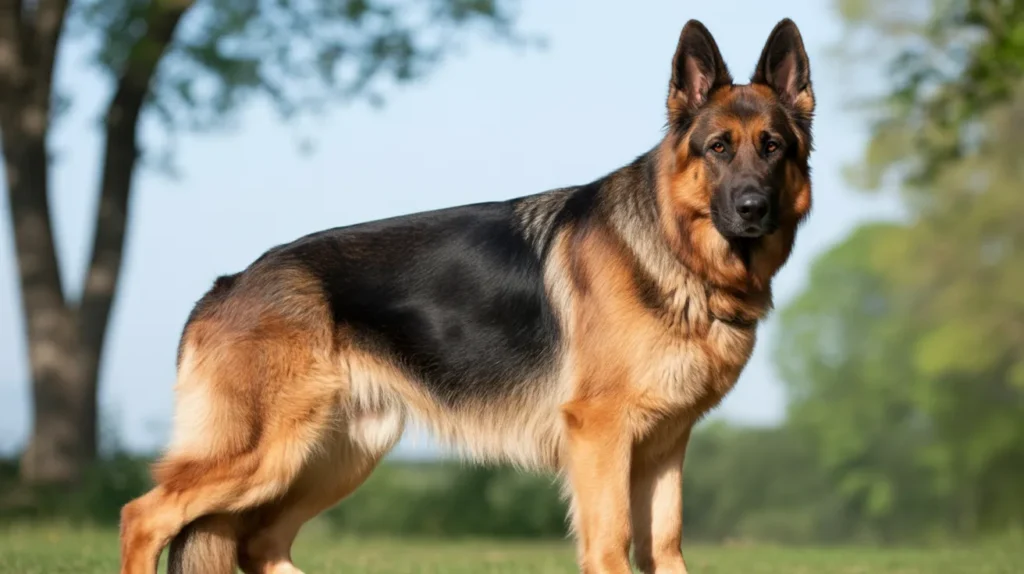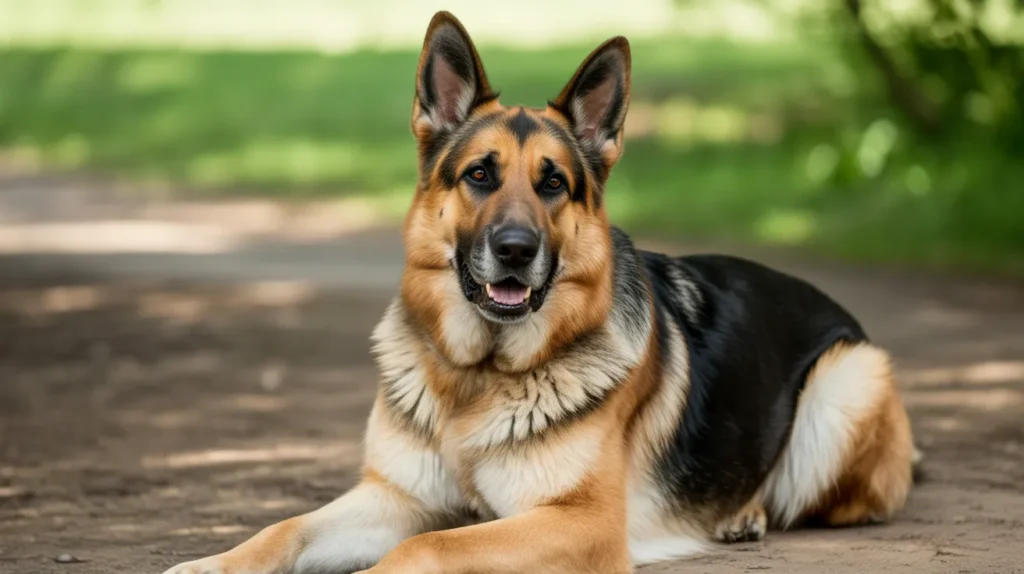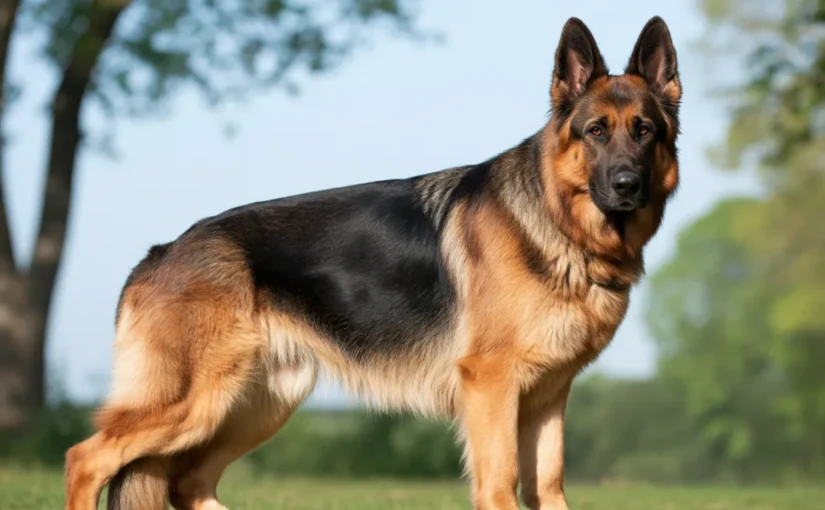King German Shepherds are more than just majestic-looking dogs—they’re intelligent, loyal, and energetic companions that require thoughtful care. As one of the largest German Shepherd variants, they’re sometimes referred to as the “King” of the breed due to their impressive size and commanding presence. In this guide, we’ll explore everything you need to know about King German Shepherds, from their history and personality traits to health, nutrition, and training tips.

Content
History and Origin of the King German Shepherd
The King German Shepherd was developed in the 1990s as a cross between a traditional German Shepherd and other large shepherd lines, primarily to achieve a taller, more robust dog with strong protective instincts. Breeders focused on height, strength, and calmness, aiming for a companion that could excel both as a family dog and a working dog.
Unlike regular German Shepherds, King Shepherds are bred specifically for size and temperament stability, making them ideal for families seeking a loyal guardian who is also gentle with children.
Growth and Development
King Shepherds grow rapidly during the first 12 months, often reaching full height by 18 months. Puppies are energetic, curious, and sometimes mischievous, requiring early socialization and training to ensure they become balanced adults.
Tips for Puppy Care:
- Establish a daily routine including exercise and training sessions
- Introduce new people, pets, and environments early
- Monitor diet carefully to support healthy growth
A well-cared-for King Shepherd puppy lays the foundation for a confident and well-mannered adult dog.
Appearance and Characteristics

King German Shepherds are known for their impressive stature, often standing 28–32 inches tall at the shoulder and weighing between 90–140 pounds. They have a double coat that comes in various colors, including black and tan, sable, and bi-color variations.
Personality Traits:
- Loyal and protective of their family
- Intelligent and easy to train with consistent methods
- Alert but not overly aggressive
- Friendly with proper socialization
Their temperament makes them excellent working dogs and family companions. A King Shepherd thrives in an environment where they have clear boundaries and mental stimulation.
Read More About: Chihuahua Terrier Mix
Exercise Needs
Due to their large size and high energy levels, King Shepherds require daily exercise. Without adequate physical and mental stimulation, they may develop destructive behaviors such as digging, chewing, or excessive barking.
Recommended Activities:
- Long walks or jogs (30–60 minutes daily)
- Interactive games such as fetch, tug-of-war, or hide-and-seek
- Obedience and agility training for mental engagement
Grooming and Coat Care
King Shepherds have a double coat that sheds heavily twice a year. Regular grooming helps maintain their coat and reduce shedding.
Grooming Tips:
- Brush 2–3 times a week using a slicker brush or undercoat rake
- Bathe only when necessary to avoid skin irritation
- Trim nails regularly and check ears for infection
Proper grooming contributes to their overall health and ensures your King Shepherd looks majestic.
Nutrition and Diet
Feeding a King German Shepherd requires attention to quality and quantity. Large dogs are prone to obesity and digestive issues, so a well-balanced diet is essential.
Diet Recommendations:
- High-protein dog food to support muscle development
- Include healthy fats for coat and skin health
- Feed in 2–3 small meals to reduce the risk of bloat
Health and Common Issues
King Shepherds are generally healthy but may face genetic and breed-specific health concerns:
- Hip and elbow dysplasia
- Bloat (gastric torsion)
- Heart conditions
- Degenerative myelopathy
Regular veterinary check-ups, preventive care, and maintaining a healthy weight are essential to minimize these risks.
Training and Socialization
Training a King Shepherd is crucial due to their size and intelligence. Positive reinforcement techniques, consistency, and early socialization make training more effective.
Key Training Tips:
- Begin obedience training as early as 8 weeks
- Reward good behavior with treats and praise
- Expose your dog to new environments, people, and pets
Training builds a strong bond and ensures your King Shepherd is well-mannered and confident.
Real-Life Case Study
Meet Max, the 3-Year-Old King German Shepherd:
Max was adopted by a family in Texas when he was just 10 weeks old. Initially, Max was extremely energetic and sometimes destructive. Through consistent training, daily exercise, and mental enrichment activities, Max transformed into a calm, obedient, and protective adult dog.
Max’s family followed a structured routine: morning jogs, mid-day puzzle toys, and evening obedience practice. Regular vet check-ups and a high-quality diet kept him healthy and vibrant. Today, Max is not only a loyal family guardian but also participates in local dog competitions, showcasing his agility and intelligence.
Takeaway: With proper care and training, a King German Shepherd can thrive in both family and working environments.
Finding a Responsible Breeder
When looking for a King German Shepherd, it’s important to choose reputable breeders who prioritize health, temperament, and proper socialization. Ask for:
- Health clearances for parents (hips, elbows, heart)
- References from previous buyers
- Opportunities to meet the puppy’s parents
Adopting from rescue organizations is also an option for those seeking a King Shepherd in need of a loving home.
Conclusion: Is a King German Shepherd Right for You?
King German Shepherds are majestic, intelligent, and loyal companions. They are best suited for owners who can provide daily exercise, consistent training, and proper care. With the right environment and attention, a King Shepherd can be a loving family member and a reliable guardian.
Whether you’re drawn to their striking appearance, intelligence, or loyal nature, owning a King German Shepherd is a rewarding experience that comes with responsibilities. Make sure you’re ready to meet their physical, mental, and emotional needs before bringing one into your home.
If you enjoy learning about unique breeds, you may also like our guide on the stunning Siberian Forest Cat.
FAQs
What is a King German Shepherd?
A King German Shepherd is a larger, taller variant of the German Shepherd, known for loyalty, intelligence, and family-friendly traits.
Difference between a German Shepherd and a King German Shepherd?
King German Shepherds are bigger, heavier, and bred for size, while standard German Shepherds are more compact and lighter.
How big do King German Shepherds get?
They can reach 28–32 inches in height and weigh 90–140 pounds, making them larger than typical German Shepherds.
What is the biggest German Shepherd?
The King German Shepherd is generally the largest type, bred for extra height and size compared to standard German Shepherds.

Meet Max, the dog’s best friend. He’s a pup-loving pro, sharing tips on training, grooming, and adventures with our four-legged companions.













